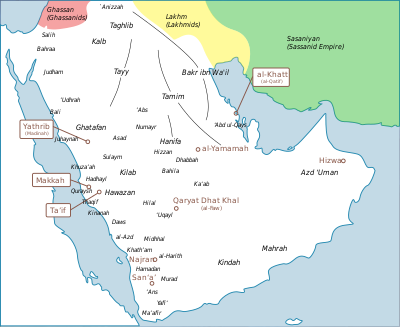Banu Hudhayl
| Banu Hudhayl بنو هذيل | |
|---|---|
| Mudarite Arab tribe | |
 Banner of Banu Hudhayl at the Battle of Siffin | |
| Ethnicity | Arab |
| Nisba | Al-Hudhali |
| Location | Saudi Arabia, Tunisia, Jordan, Egypt |
| Descended from | Hudhayl ibn Madraka |
| Parent tribe | Banu Mudar |
| Branches |
|
| Language | Arabic |
| Religion | Sunni Islam |
Banu Hudhayl (Arabic: بنو هذيل) is an Arab tribe that originated in the Hejaz. The tribe mainly inhabits Saudi Arabia, Tunisia,[1] Jordan and Egypt. The tribe was one of the tribes in contact with the Islamic prophet Muhammad and they are known throughout history for their talented poets and intellectuals, as well as their help in repelling the Qarmatians in the 10th-century Sack of Mecca.[2]
Ancestry
[edit]The tribe traces a genealogical history backwards from their eponymous ancestor to Adam:
Hudhayl son of Madrakah son of Ilyas (Elijah) son of Madher son of Nazar son of Ma'ad son of Adnan son of Add son of Send son of Napyot[3] son of Ishmael[4][5] son of Abraham[6][7][8] son of Azar[9][10][11] (Terah) son of Nahor[12] son of Srooj[13] son of Ra'o[14] son of Phaleg[15] son of Aber[16] son of Shaleh[17][18][19] son of Arpheckshad[20] son of Sam son of Noah son of Lamek[21] son of Motoshaleh son of Edres (Enoch) son of Yared son of Mehlaiel son of Qenan son of Anosh son of Seth son of Adam
The Tribe of Hudhayl in Hijaz
[edit]
Banu Hudhayl are divided in two branches: Lihyan ibn Hudhayl and Sa'ad ibn Hudhayl.
Lihyan ibn Hudhayl
[edit]The descendants of Lihyan ibn Hudhayl who founded the Arab kingdom of Lihyan, and presently live in the desert between Mecca and Ta'if. They are now divided into two clans:
- Mohrez, subdivided into
- Alhosianat
- Aldhban
- Almosah
- Marer, subdivided into
- Albatahah
- Almasaibah
- Alnegimah
- Aloodah
Sa'ad ibn Hudhayl
[edit]There are presently four descendent clans of Sa'ad ibn Hudhayl:
- Beni, subdivided into
- Banu Omair
- Banu Mas'od
- Banu Mohaiya
- Banu Nobatah
- Fleet, subdivided into
- Al-Hatareshah
- Al-Afran
- Al-Eyadh
- Hudhayl Albogom
- Banu Reshah
- Al-Matarefah
- Al-Sa'iedah
- Al-Moatan
- Al-Dhumayeen
- Al-Hatareshah
- Zohair, subdivided into
- Al-Srawnah
- Da'ad
- Sahelah
- Zolayfah.
- Jamil, subdivided into
- Alqarh
- Al-Mahmud
- Al-Kedwa (also known as Alkedawi)
- Al-Sawalima
- Al-Kabakiba
- Beni kaeb
- Bani yas
- Bani zayd
- Banu ziad
- Al-Hasasana
- Al zalifa
- Alshaeabin
- Altalahat
- Al khalid
- Albaqla
- Al hamid
- Al zaydan
- Sahila
- Aleabida
- Aljawabira
- Alnnjb
The Tribe of Hudhayl in Najd
[edit]
Hudhayl Alboqum from Al-Hatareshah & Al-Dhumayeen including:
- Dhawi Shaddad (Eyadh Ibn Mohsen) from Dhawi Mohsen from Al-Eyadh from Al-Hatareshah
- Dhawi Dafnaan (Maqbool Al-Afraani) from Al-Afraan from Al-Hatareshah
- Dhawi Wafi (Wafi Al-Dhumayaani) from Al-Dhumayeen
Mutarifa al-Tayr and their branches:
- Al-Ajlan
- Al-Jubayr
- Al-Jabr
- Al-Hujay
- Hudhail Al-Su'ran
- The Al-Tawil family of Al-Dir'iyah
- Al-Sulaiman
- Al-Hussein
- Al-Amash
- Al-Eid
- Al-Issa
Arabian tribes that interacted with Muhammad
[edit]Known members
[edit]- Mu’qel Ibn Khuwaylid, a knight and tribal chief during Al-Jahiliyya.
- Abdullah bin Masud, a companion of Muhammad.
- Al-Sakhr Al-Ghai, poet during Al-Jahiliyya.
- Abdumanaf Ibn Rub’, poet during Al-Jahiliyya.
- Abū Dhuʾayb al-Hudhalī, poet contemporary of Muhammed.
- Abu Kabeer Al-Hudhalī, poet in late Jahiliyya and early Islamic period.
- Sinan ibn Salamah ibn Mohbik, Umayyad general and governor of Sindh.
- Ubayd-Allah ibn Abd-Allah, Hadith narrator.
- Al-Masudi, Abbasid historian.
- Meq’ed of Hudhayl Al-Bogoom an Arab nobleman, knight, tribal chief and horse owner in the 19th century.
- Adel Al-Jubeir, Saudi diplomat and Minister of State for Foreign Affairs.
- Aboul-Qacem Echebbi, Tunisian 20th century anti-colonialist Poet.
Notes
[edit]- ^ Ibn Khaldun, Kitab al-Ibar, vol. 2, p. 319.
- ^ Al-Masudi (2009). Al-Tanbīh wa l-ishrāf. Vol. 1. Cairo, Egypt: Maktabat El Thaqafya El Diniah. ISBN 9773413519
- ^ Book of Genesis 25:12-16
- ^ Ishmael, Encyclopedia of the Qur'an
- ^ Azraqi, Akhbar Makkah, vol. 1, pp. 58-66
- ^ Abraham, Sarah and Hagar Archived 2011-07-25 at the Wayback Machine - James D. Brown
- ^ Genesis 16:1-6
- ^ Qur'an 2:127 to 136
- ^ Qur'an 6:74
- ^ Islamic view of Abraham
- ^ Qur'an 37:99–111
- ^ Luke 3:35
- ^ Book of Genesis11:20-23
- ^ Genesis 11:20
- ^ Genesis 10:25
- ^ Adamic language
- ^ Genesis 10:24
- ^ Genesis 11:12-13
- ^ Luke 3:36
- ^ Book of Genesis 10:22, 24; 11:10-13; 1 Chron. 1:17-18
- ^ Luke 3:37
- ^ Quraish
- ^ Quraysh (sura)
Further reading
[edit]- History Ibn Khaldun
- History Ibn al-Athir
- History Ibn Hisham
- History Al-Hamdani
- History Ibn Ishaq
- Kinship and marriage in early Arabia by \ Smith W. Robertson
- A universal history, from the earliest accounts to the present time by \ Universal
- The Koran, Commonly Called the Alcoran of Mohammed by George Sale, Savary
- A Short History of the Arabs by \ Francesco Gabrieli, Salvator Attanasio
- The March from Medina by \ John Walter Jandora
- Muhammad by \ Muhammad Zafrulla Khan
- Mohammed and the Rise of Islam by \ D. S. Margoliouth
- History of Arabia, Ancient and Modern by \ Andrew Crichton
External links
[edit]- https://web.archive.org/web/20080316215832/http://www.hathailly.com/vb/showthread.php?t=11324
- http://lahyan.net/vb/archive/index.php/t-24.html[permanent dead link]
- http://www.tmeme.com/vb/showthread.php?t=342
- https://web.archive.org/web/20080403064904/http://www.thearabhistory.com/mudar
- Arabian tribes that interacted with Muhammad
- http://sirah.al-islam.com/SearchDisp.asp?ID=113&SearchText=هذيل%20بن%20مدركة&SearchType=root&Scope=all&Offset=20&SearchLevel=QBE[permanent dead link]
- http://sirah.al-islam.com/SearchDisp.asp?ID=1672&SearchText=هذيل%20بن%20مدركة&SearchType=root&Scope=all&Offset=20&SearchLevel=QBE[permanent dead link]
- https://web.archive.org/web/20100222125145/http://sirah.al-islam.com/tree.asp?ID=1&t=book2
- https://web.archive.org/web/20080309174242/http://sirah.al-islam.com/Display.asp?f=rwd1012
- https://web.archive.org/web/20100122083326/http://sirah.al-islam.com/Display.asp?f=rwd1014
- https://books.google.com/books?id=baw9AAAAIAAJ&dq=Lihyan&pg=PA155
- https://books.google.com/books?id=CR9iAgUwmTEC&pg=PA338&dq=Lihyan&lr=
- https://books.google.com/books?id=SLvnnT31Du0C&dq=%22Hodhail%22&pg=PA230
- http://www.familytreedna.com/public/J1arabproject/default.aspx
- https://web.archive.org/web/20090208095900/http://whitebook.com/p_1_en.htm
